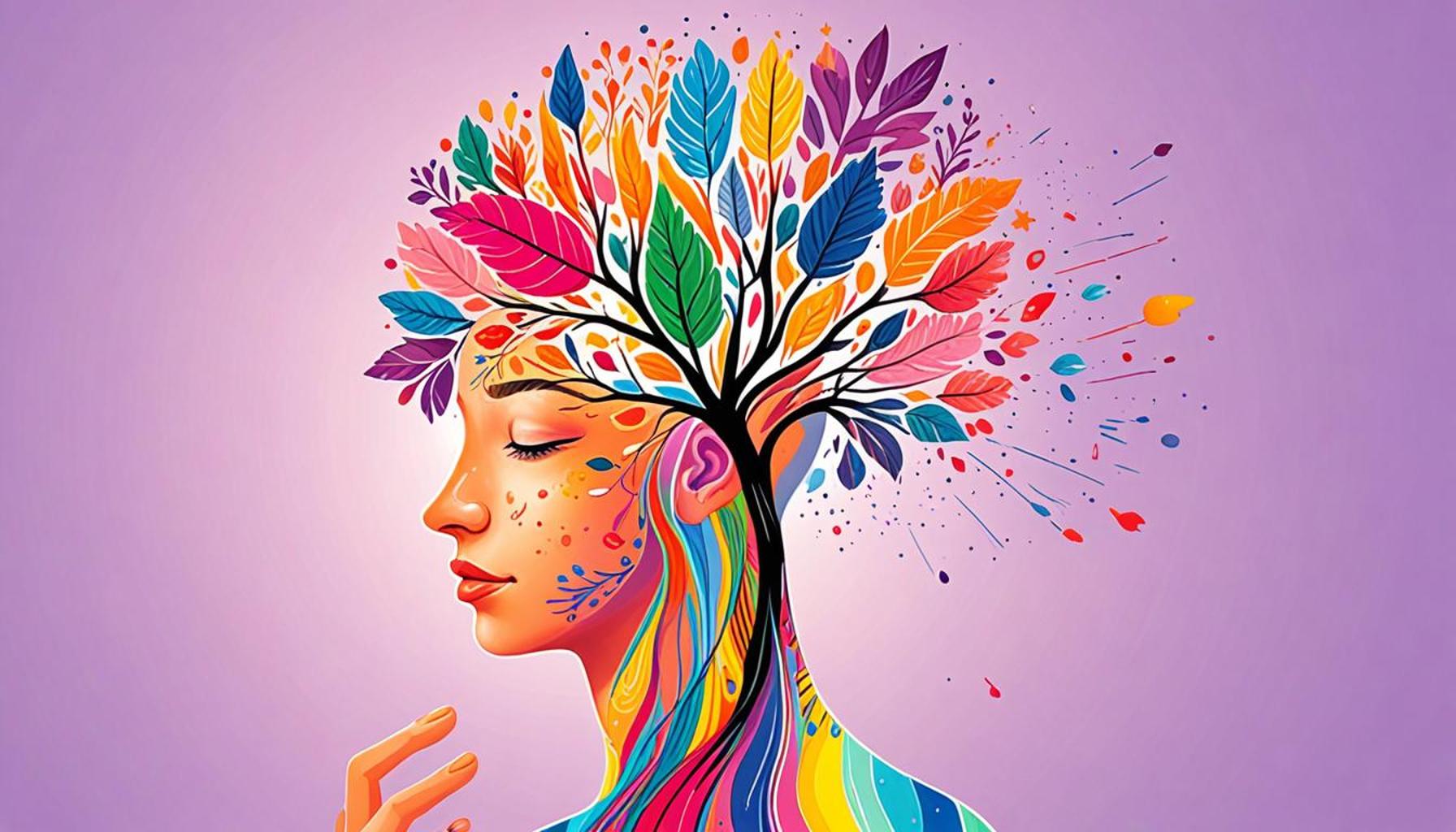Techniques of Self-Reflection to Overcome Challenges and Foster Resilience

The Power of Self-Reflection in Building Resilience
Life’s journey is indeed filled with challenges that can feel overwhelming at times. Each hurdle we face is an opportunity to develop our inner strength and resilience. The process of self-reflection is vital in this journey, allowing individuals to understand themselves at a deeper level and ultimately, aiding them in overcoming life’s trials.
Understanding Self-Reflection
Self-reflection involves examining one’s thoughts, feelings, and actions. This practice can lead to significant personal growth and emotional stability. In the context of Nigeria, where socio-economic hardships and environmental changes frequently impact daily life, cultivating resilience through self-reflection is particularly critical. It not only equips individuals with the tools to cope with hardships but also encourages a proactive approach to personal development.
Effective Techniques for Self-Reflection
To fully leverage the benefits of self-reflection, one can incorporate specific techniques into their daily routine. Here are a few methods, enhanced with insights relevant to Nigerian readers:
- Journaling: Maintaining a journal allows one to articulate thoughts and feelings effectively. For example, a student experiencing academic pressure can jot down their worries, leading to clearer insights into their motivations and areas for improvement. This practice can help identify recurring patterns, enhancing self-awareness and enabling better decision-making.
- Meditation: Mindfulness meditation, even for just a few minutes daily, can foster mental clarity. In Nigeria, where the hustle and bustle of city life can be overwhelming, taking time to meditate in a calm space—be it a quiet room or a serene spot in a local park—can provide a refreshing perspective and a reprieve from stress. It allows individuals to observe their thoughts without judgment, fostering a deeper connection with themselves.
- Feedback from Trusted Individuals: Engaging with mentors or peers is another invaluable reflective practice. In many Nigerian communities, cultural ties run deep, and conversations with family members or respected elders can offer guidance that challenges one’s perspectives. This feedback can provide new angles to consider when facing personal difficulties, fostering growth and adaptability.
Integrating Self-Reflection into Daily Life
By integrating these techniques into their lives, Nigerians can expect to enhance their self-awareness and promote overall mental well-being. For instance, a business owner navigating market fluctuations can benefit from journaling to process experiences, meditating to calm the mind before making critical decisions, and seeking advice from seasoned entrepreneurs to refine their approach. Each facet of self-reflection acts as a cornerstone for resilience, empowering individuals not just to endure challenges but to thrive amidst them.
As we delve deeper into these transformative practices, it becomes evident that self-reflection is not merely an introspective exercise. It is a powerful tool that can lead to overcoming obstacles, fostering personal development and ensuring one emerges stronger, more capable, and prepared to navigate the complexities of life with grace and fortitude.

YOU MAY ALSO LIKE: Read read another article
Harnessing the Art of Self-Reflection
In a world that constantly demands our attention and energy, self-reflection stands out as a crucial tool in developing resilience. Understanding and managing our internal landscape can significantly impact how we respond to external pressures. In Nigeria, where individuals often face multifaceted challenges—ranging from economic instability to societal expectations—self-reflection can lay the groundwork for overcoming adversities and fostering a robust sense of self.
Key Techniques to Facilitate Self-Reflection
To gain the most from the practice of self-reflection, it is essential to employ effective techniques tailored to individual needs. Below are several methods, resonant with the Nigerian experience, that can empower individuals to enhance their resilience levels:
- Daily Reflection: Allocating time each day for a moment of pause can make a significant difference. Reflecting on the day’s events, achievements, and challenges can help identify feelings that need addressing. For instance, an entrepreneur in Lagos might take a few minutes at the end of the day to assess how client interactions went, recognizing stress triggers and planning for improved communication in the future.
- Guided Questions: Asking oneself specific questions can drive deeper insights. Questions like “What did I learn today?” or “How did I handle conflicts?” can stimulate critical thinking. A college student grappling with academic demands might find clarity in evaluating their study strategies, leading to adjustments in their approach based on self-feedback.
- Nature Walks: For many, especially in a country blessed with beautiful landscapes, taking a walk in nature can facilitate reflective thinking. In Nigeria, the serene atmosphere of parks or natural reserves can offer a peaceful setting to contemplate life’s challenges, creating a mental space to process experiences away from everyday distractions.
Building a Reflective Habit
Creating a habit of self-reflection is essential for continual personal development. Simple strategies such as setting reminders on your phone, or designating specific times, such as Sunday evenings, for deeper reflection can provide structure. For instance, a working professional in Abuja can use Sunday nights to reflect on the week, evaluating both victories and areas needing change. This commitment to reflection can pave the way for ongoing growth and a more resilient mindset.
Utilizing these techniques can transform the way individuals in Nigeria confront challenges. Each method acts as a stepping stone, providing clarity and empowering individuals to tackle life’s complexities with a renewed sense of purpose. As we explore these techniques further, it becomes clear that self-reflection is not merely an act of looking inward, but rather a profound journey that enhances our capability to thrive amidst adversity.
Techniques of Self-Reflection to Overcome Challenges and Foster Resilience
Self-reflection is a powerful tool that allows individuals to delve deep into their thoughts, emotions, and behaviors, ultimately leading to a greater understanding of themselves and their experiences. By actively engaging in reflective practices, one can identify patterns of thought that may hinder personal growth or contribute to feelings of overwhelm. This process not only aids in recognizing internal challenges but also lays a foundation for developing resilience.
One effective approach to self-reflection is journaling. This technique encourages individuals to articulate their thoughts and feelings on paper, providing clarity and a sense of release. Journaling can reveal recurring challenges and highlight the progress made over time, reinforcing a sense of achievement and motivating further introspection.
Another valuable technique is guided meditation, which helps focus the mind and enhances emotional awareness. Through meditation, individuals can cultivate mindfulness, becoming more attuned to their reactions and coping mechanisms. This heightened awareness is crucial in transforming negative thought patterns into constructive dialogues.
Engaging in discussions with a mentor or therapist can also facilitate self-reflection. These conversations encourage external perspectives that may illuminate blind spots and broaden one’s understanding of particular challenges. The feedback received can be invaluable in fostering resilience and developing new strategies to manage difficulties.
Incorporating practices like self-assessment quizzes or reflective questionnaires can also serve as prompts for deeper consideration. These tools can guide individuals to confront uncomfortable emotions and provoke insightful realizations about personal strengths and weaknesses.
Through these techniques, the art of self-reflection not only assists in overcoming challenges but also builds a sturdy framework for resilience—an essential trait for navigating life’s uncertainties. By becoming more self-aware and adapting one’s strategies, individuals can embrace obstacles as opportunities for growth and learning.
| Category 1 | Category 2 |
|---|---|
| Journaling | Encourages articulation of thoughts, revealing patterns and progress. |
| Guided Meditation | Enhances emotional awareness and mindfulness in response to challenges. |
| Mentorship/Therapy | Provides external perspectives and feedback, facilitating deeper understanding. |
| Self-Assessment Tools | Guides confrontation of uncomfortable emotions and realizations. |
YOU MAY ALSO LIKE: Read read another article
Deepening Insight Through Creative Expression
Another powerful method for enhancing self-reflection is through creative expression. The act of writing, painting, or engaging in other forms of creativity can serve as an outlet for emotions and thoughts that may otherwise remain unarticulated. In Nigeria, where storytelling and art hold deep cultural significance, harnessing creativity can become a transformative tool for self-discovery and resilience building.
- Journaling: Maintaining a personal journal is a compelling way to chronicle daily experiences and emotions. It allows individuals to document their thoughts freely, examining both positive and negative occurrences. A teacher in Kano facing classroom management challenges might jot down their experiences after each school day, gradually uncovering patterns that highlight effective teaching strategies and areas requiring attention.
- Art Therapy: Engaging in art, whether through painting, drawing, or crafting, can allow for a unique form of self-reflection. The creative process often provides a healing avenue to confront internal struggles. For example, a young artist in Port Harcourt may create pieces that convey their feelings about family pressures or societal expectations, turning turmoil into artistic expression, ultimately fostering resilience in the face of adversity.
- Music and Poetry: Music and poetry are integral parts of Nigerian culture and can serve as powerful tools for self-reflection. Writing songs or poems about personal challenges can help articulate feelings and reframe experiences. A musician in Ibadan may write lyrics reflecting on their journey, allowing listeners to relate, thereby generating a community of support while fostering resilience.
Embracing Mindfulness Practices
Incorporating mindfulness practices into one’s routine enhances the depth of self-reflection. By cultivating an awareness of the present moment, individuals can better understand their reactions to external stimuli. In Nigerian urban settings like Lagos, the fast pace of daily life can often detract from mindfulness. Nevertheless, intentional practices can work wonders in promoting resilience.
- Meditation: Regular meditation can help calm the mind, allowing for a deeper exploration of thoughts and feelings. Finding a quiet space, perhaps amid the bustling city, can create an opportunity to sit in silence and reflect on personal challenges. Research has shown that even short, consistent sessions can significantly improve emotional regulation and resilience, positioning individuals better to face adversities.
- Breathwork: Techniques such as deep breathing can facilitate self-reflection by grounding individuals in their bodies. In moments of stress—whether related to work, family, or societal pressures—taking a few minutes to focus on breathing can enhance clarity and prevent overwhelm. This technique is particularly useful in high-stress environments like busy markets in Nigeria, allowing individuals to regain composure and reflect on their next steps.
Engaging in Peer Reflection
While self-reflection typically emphasizes individual processes, involving peers can enrich the experience. In Nigerian communities, where social interactions are central, discussing challenges with others can provide new perspectives and insights. Establishing or joining a reflective group, perhaps with colleagues or friends, can create a safe space for vulnerability and mutual support.
- Accountability Partners: Engaging with a trusted friend or confidant can help maintain focus on personal growth objectives. By sharing experiences and providing feedback, individuals foster a culture of support that encourages resilience. For instance, two professionals in Abuja can regularly meet to discuss their career hurdles and collectively brainstorm coping strategies.
- Group Discussions: Organizing group discussions focused on specific issues can lead the way to collective problem-solving. Communities in Nigeria often possess rich oral traditions that can be employed to share stories of resilience and communal support, thereby reinforcing collective learning through personal narratives.
Incorporating these varied techniques not only enriches the practice of self-reflection but also creates a layered path toward building resilience. By enhancing the quality of internal dialogue and community connections, individuals can navigate challenges with renewed strength and insight.
ADDITIONAL INSIGHTS: Expand your understanding here
Harnessing the Power of Self-Reflection for Resilience
In conclusion, the journey towards overcoming challenges and fostering resilience through self-reflection is both intricate and rewarding. By employing a diverse array of techniques such as creative expression, mindfulness practices, and peer reflection, individuals can cultivate a deeper understanding of themselves, ultimately empowering them to tackle adversities head-on.
Nigerian culture, rich in storytelling and collective wisdom, provides an excellent backdrop for integrating these practices. As individuals engage in journaling, they can articulate their experiences and emotions more clearly, whilst creative outlets like art, music, and poetry create profound connections to the community and self. On the other hand, mindfulness practices such as meditation and breathwork serve as essential tools for grounding oneself amidst life’s chaos, particularly in urban areas where distractions abound.
Moreover, the significance of engaging in peer reflection cannot be overstated. Collaborative support through accountability partners and group discussions not only facilitates personal growth but also weaves a fabric of resilience within communities. These interactions allow for shared experiences to pave the way for collective learning and sustainable emotional well-being.
As we embrace these techniques, we open doors to personal insights and communal understanding, driving forward on the path to resilience. Ultimately, self-reflection holds the potential to transform obstacles into opportunities, and by making it a priority, individuals in Nigeria and beyond can cultivate a more resilient future.


